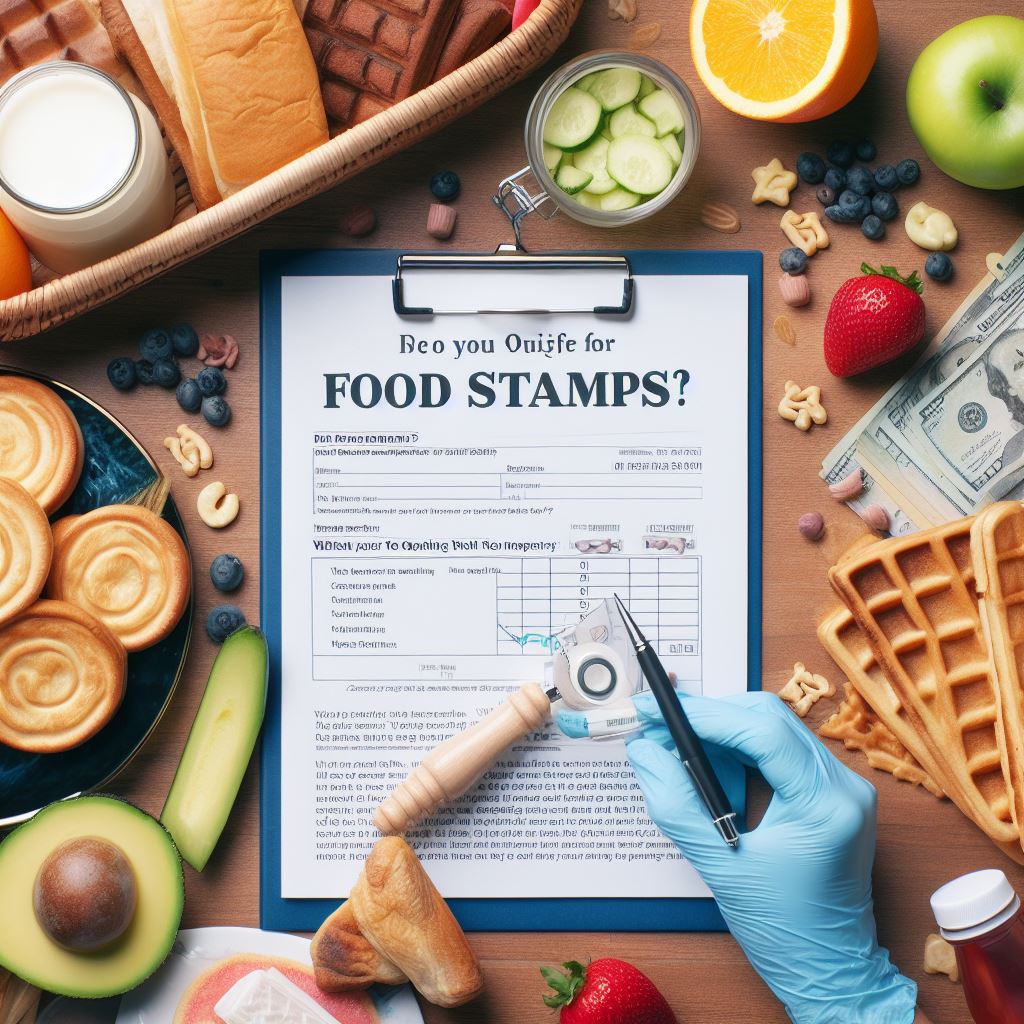8 Key Eligibility Requirements for Food Stamps Application

Are you struggling to make ends meet? Need help putting food on the table? Look no further!
Discover the 8 key eligibility requirements for food stamps application. By meeting these criteria, you can access the support you need to feed yourself and your family.
From income limits and citizenship status to employment and disability, this article outlines everything you need to know.
Don’t miss out on this vital information – read on to learn more!
Key Takeaways
- Income limits vary based on household size and certain types of income are excluded from the calculation.
- U.S. citizens and lawful permanent residents with a valid Green Card or qualifying immigration status are eligible for food stamps.
- Unemployment does not automatically disqualify you from receiving food stamp assistance, and active job seekers who can demonstrate their efforts may still be eligible.
- Each state sets its own asset limits for food stamp eligibility, and certain assets are exempt from the limit.
Income Limits
To determine if you’re eligible for food stamps, you must meet specific income limits set by the government. These income limits are designed to ensure that assistance is provided to those who truly need it.
The exact income limits vary depending on the size of your household. For example, if you’re a single individual, your monthly gross income must be below a certain threshold. If you have a larger household, the income limits increase accordingly.
It’s important to note that not all forms of income are included in the calculation. The government excludes certain types of income, such as Supplemental Security Income (SSI), from the calculation. Additionally, deductions may be applied to your income, such as expenses for dependent care or medical costs.
It’s recommended to check the specific income limits for your household size in your state, as they may vary slightly. Ensuring that your income falls within these limits is crucial for determining your eligibility for food stamps.
Household Size
When applying for food stamps, it’s essential to determine your eligible household size. This includes all individuals who live and purchase food together, such as family members or roommates.
It’s important to keep in mind that any changes in your household size, such as the addition of a new member or someone moving out, can affect your eligibility and benefit amount.
Determining Eligible Household Size
You must determine your household size before applying for food stamps. The size of your household will determine your eligibility for the program. To determine your household size, you need to include everyone living in your home who you buy and prepare food with.
This includes your spouse, children, parents, and any other individuals who live with you and share meals. It’s important to note that roommates who don’t share meals with you aren’t considered part of your household.
When applying for food stamps, you’ll need to provide the names, ages, and relationships of all household members. This information will be used to assess your eligibility and calculate the amount of benefits you may receive.
Impact of Household Changes
If there are any changes in your household size, it can affect your eligibility for food stamps. It’s important to understand how these changes may impact your benefits.
Here are some key points to consider:
- Increase in household size: If someone new moves into your household, it may increase the number of people you need to support. This could potentially make you eligible for additional food stamp benefits.
- Decrease in household size: On the other hand, if someone leaves your household, your eligibility for food stamps may decrease since there are fewer people to support.
- Birth or adoption: If you have a new child through birth or adoption, you may be able to include them in your household size and potentially qualify for more benefits.
- Marriage or divorce: If you get married or divorced, your household size may change, which can impact your eligibility for food stamps.
- Adult children: If your adult children move back into your household, their income and resources will be considered, which could affect your eligibility.
Remember to report any changes in your household size to the food stamps program to ensure accurate determination of your eligibility and benefits.
Citizenship Status
To qualify for food stamps, you must meet the eligibility requirement regarding your status as a citizen. The Supplemental Nutrition Assistance Program (SNAP), commonly known as food stamps, is a government assistance program designed to help low-income individuals and families afford nutritious food. Citizenship status is an important factor in determining eligibility for this program.
The table below provides an overview of the citizenship requirements for food stamps:
| Eligibility | Description |
|---|---|
| U.S. Citizens | Must be a U.S. citizen to be eligible for food stamps. |
| Lawful Permanent Residents | Must have a valid Green Card or another qualifying immigration status. |
| Refugees and Asylees | Individuals granted refugee or asylee status are eligible for food stamps. |
| Special Immigrant Status | Certain categories of immigrants, such as victims of trafficking or domestic violence, may be eligible. |
| Non-Citizens with Children | Non-citizens with children who are eligible for food stamps can also receive benefits for their children, regardless of their own citizenship status. |
It is important to note that undocumented immigrants are not eligible for food stamps. However, it’s worth exploring other assistance programs that may be available to them. Understanding the citizenship requirements is crucial when applying for food stamps to ensure that you meet the necessary criteria.
Residency Requirements
Meeting the residency requirement is essential for eligibility for food stamps. To qualify for food stamps, you must meet the following residency requirements:
- You must be a resident of the state where you’re applying for food stamps.
- You must have a valid Social Security number.
- You must be a U.S. citizen or a qualified non-citizen.
- You must provide proof of residency, such as a lease agreement or utility bill.
- If you’re homeless, you can still apply for food stamps by providing a statement from a shelter or other organization verifying your residency.
Residency requirements are put in place to ensure that food stamps are provided to those who truly need them in a specific state. By requiring proof of residency, the program aims to prevent fraud and ensure that resources are allocated to those who are eligible.
It’s important to provide accurate and up-to-date information regarding your residency when applying for food stamps. Failure to meet the residency requirements may result in your application being denied.
Employment Status
To be eligible for food stamps, you must meet certain job requirements. This means that you must either be employed or actively seeking employment.
If you’re unemployed, you may still be eligible for food stamps as long as you’re actively looking for a job and can provide documentation of your job search efforts.
Job Requirements for Eligibility
You must have a job to meet the eligibility requirements for food stamps application. In order to qualify for food stamps, you must meet certain job requirements. These requirements include:
- Employment Status: You must be employed and working a certain number of hours per week to be eligible for food stamps.
- Income Level: Your income must fall below a certain threshold to qualify for food stamps.
- Job Training: If you’re unemployed or underemployed, you may be required to participate in job training programs to be eligible for food stamps.
- Job Search: If you’re unemployed, you may be required to actively search for employment to maintain your eligibility for food stamps.
- Volunteer Work: In some cases, you may be required to participate in volunteer work to meet the job requirements for food stamps.
Unemployment Implications for Eligibility
If you’re unemployed, your employment status may have implications for your eligibility for food stamps. When applying for food stamps, one of the key eligibility requirements is having a job or actively seeking employment. However, being unemployed doesn’t automatically disqualify you from receiving assistance.
The Supplemental Nutrition Assistance Program (SNAP) takes into account various factors when determining eligibility, such as income, household size, and expenses. If you’re actively looking for work and can demonstrate your efforts, you may still be eligible for food stamps.
It’s important to note that each state has its own specific guidelines and requirements, so it’s crucial to check with your local SNAP office to understand the eligibility criteria in your area.
Asset Limits
When applying for food stamps, it’s important to be aware of the eligibility requirements, including the limits on your assets. Here are five key things you need to know about asset limits for food stamps:
- Countable assets: Food stamp programs consider certain assets as countable, which means they’re included in the calculation of your eligibility. This includes cash, bank accounts, stocks, bonds, and real estate other than your primary residence.
- Asset limits: Each state sets its own asset limits for food stamp eligibility, so the specific limits may vary. However, in general, the limits are low. For example, some states have a limit of $2,250 for households without elderly or disabled members.
- Exempt assets: Not all assets are counted towards the limit. Some common exemptions include your primary residence, household goods, personal belongings, and certain retirement accounts.
- Liquid assets: Liquid assets, such as cash and funds in bank accounts, are typically subject to stricter limits than non-liquid assets like real estate. This means having too much cash or readily available funds may affect your eligibility.
- Reporting changes: It’s important to report any changes in your assets promptly. If your assets increase and exceed the limits, you may become ineligible for food stamps. Conversely, if your assets decrease, you may become eligible or qualify for a higher benefit amount.
Understanding the asset limits for food stamps is crucial in determining your eligibility. By being aware of these limits and reporting any changes, you can ensure that you receive the assistance you need.
Disability Status
To determine your eligibility for food stamps, it’s important to consider your disability status. If you have a disability, you may qualify for food stamp benefits. The Supplemental Nutrition Assistance Program (SNAP) takes into account the impact of disabilities on a person’s ability to work and provide for themselves.
To qualify as disabled, you must meet the criteria set by the Social Security Administration (SSA). The SSA defines disability as the inability to engage in substantial gainful activity due to a medically determinable impairment that has lasted or is expected to last for at least 12 months. This impairment must prevent you from performing any substantial work in the national economy.
When applying for food stamps, you’ll need to provide documentation of your disability status. This can include medical records, diagnosis reports, or a letter from a healthcare professional. It’s important to note that receiving disability benefits from the SSA doesn’t automatically qualify you for food stamps. The eligibility criteria for SNAP are separate and based on income and household size.
Now that you understand the importance of considering your disability status, let’s move on to the next eligibility requirement: age.
Age Requirements
To determine your eligibility for food stamps, consider your age as a key requirement. The age requirements for food stamp eligibility vary depending on the state you reside in. However, there are some general guidelines that apply across the board. Here are five key points to keep in mind:
- You must be at least 18 years old to apply for food stamps on your own. If you’re under 18, you may still be eligible if you’re considered an emancipated minor, homeless, or have a child to support.
- There’s no upper age limit for food stamp eligibility. As long as you meet the other requirements, such as income and resource limits, you can apply for food stamps regardless of your age.
- If you’re between the ages of 18 and 50 and have no dependents, you may be subject to work requirements. This means you may need to work or participate in a work program for a certain number of hours per week to maintain your eligibility.
- Certain age groups, such as elderly individuals aged 60 or older, may have additional eligibility criteria or benefits available to them. These may include simplified application processes or higher income limits.
- Age requirements may vary for individuals with disabilities. If you have a disability, you may be eligible for food stamps regardless of your age if you meet the other eligibility criteria.
Frequently Asked Questions
Can I Apply for Food Stamps if I Am Unemployed?
Yes, you can apply for food stamps if you are unemployed. The eligibility requirements consider factors such as income, household size, and expenses. It’s important to provide accurate information when submitting your application.
Are There Any Specific Documents I Need to Provide as Proof of My Income for the Food Stamps Application?
You’ll need to provide specific documents as proof of your income for the food stamps application. Make sure to have pay stubs, tax returns, or other income verification forms ready to submit.
Can I Still Apply for Food Stamps if I Am a College Student Living Away From Home?
Yes, you can still apply for food stamps if you’re a college student living away from home. The eligibility requirements may vary, but it’s worth checking with your local authorities to see if you qualify.
What Happens if My Household Size Changes After I Have Already Applied for Food Stamps?
If your household size changes after you’ve applied for food stamps, you need to report the change to the relevant authorities. This can affect your eligibility and the amount of benefits you receive.
Are There Any Exceptions to the Citizenship Status Requirement for Food Stamps Eligibility?
Yes, there are exceptions to the citizenship status requirement for food stamps eligibility. If you are an eligible non-citizen, such as a refugee or asylee, you may qualify for benefits.



